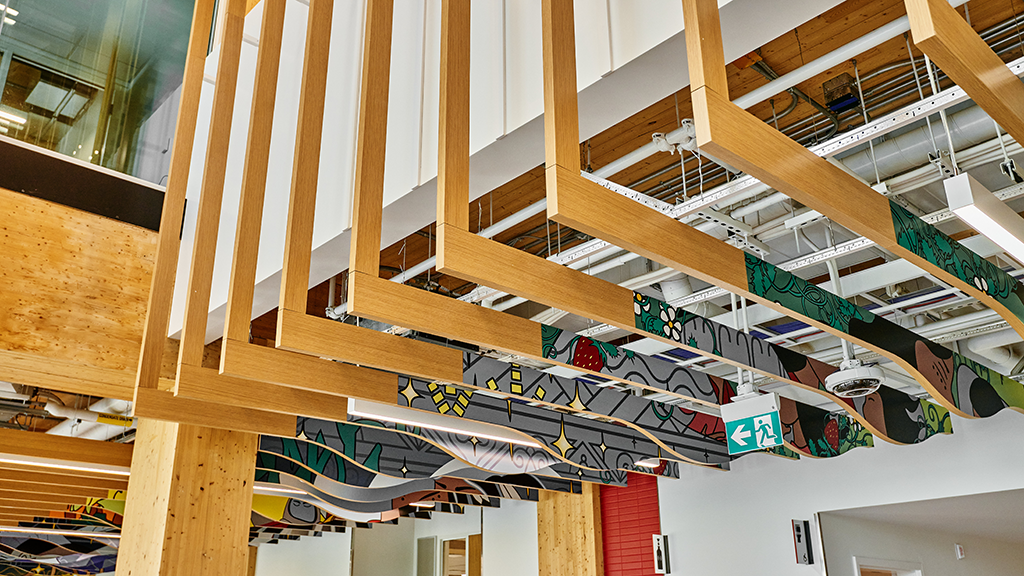Two construction science specialists from EllisDon say Canada’s homegrown mass timber construction sector is creating its own momentum, with the cost gap between the product and traditional materials continuing to decrease and innovators learning new best practices with every successful project.
As of Jan. 1, Ontario’s Building Code has been updated to allow construction of mass timber buildings up to 18 storeys, up from 12 storeys.
An RBC report estimated the market could reach $4.9 billion by 2030 if global demand continues to grow at an annual rate of 14.5 per cent.
The same study noted widespread adoption of wood, specifically mass timber, could cut embodied emissions in buildings by as much as 25 per cent.
Mark Gaglione and Vincent Davenport, directors of construction sciences with EllisDon, say success breeds success in the sector. Two of the firm’s Toronto projects that were completed in the past year-and-a-half, T3 Sterling Road from Hines and Centennial College’s A Block Expansion project, used mass timber from British Columbia and Quebec respectively.
Davenport and Gaglione say they are agnostics when it comes to advocating for building materials, given that mass timber may not be the best solution in every case. They say use of mass timber tends to be owner-driven — committed owners opt for mass timber for reasons of esthetics, sustainability and innovation.
“Initially it was a big cost premium, 25, 30 per cent, and then three, four years ago, it was down to like 15 per cent and today we’re sitting closer to a single-digit-per cent cost premium,” said
Gaglione.“The cost of timber is changing as the markets are developing and more people are coming online.”
The Centennial College project, completed in late 2023, was a 133,000-square-foot, $112-million expansion that saw 20 classrooms, eight labs and offices constructed. EllisDon was the design-builder.
It was one of the first mass timber post-secondary facilities in Canada and achieved certification under the CaGBC’s Zero Carbon Building Standard.
The project used cross-laminated timber from Quebec manufacturer Nordic Structures. The glulam beams use timber from black spruce trees from northern Quebec forests, Davenport explained.
“They’ve built a business around taking smaller, less mature trees and producing high-value products out of it,” he said.
Gaglione and Davenport said the project was notable for several reasons including the extensive testing EllisDon undertook to advance its knowledge of moisture resilience and also the teamwork that went into determining the optimum use of mass timber with other materials. Nordic has its own team of product engineers and EllisDon is able to draw upon extensive in-house expertise.
“Centennial College is a good example of a (mass timber) job with multiple concrete cores and a concrete podium that allowed that design team and client to really achieve what was the optimum delivery of those goals – carbon sustainability, esthetics,” said Gaglione.
Davenport said the pre-project moisture testing program enabled the team to assess different coatings and membranes.
“What would we do to mitigate that risk of wood getting too wet during construction, one, and two, what happens if the wood does get wet during construction?” said Davenport. “What’s our backup plan?”
T3 Sterling Road is an eight-storey timber-based office building in Toronto’s Junction Triangle designed as a creative office campus. It was completed last year. The architects were DLR Group and WZMH Architects, with EllisDon as the general contractor.
The structure used Dowel Laminated Timber (DLT) floors, supported by glulam post and beam framing. Steel brace frames act as the lateral system.
Davenport said the use of DLT was an opportunity to showcase innovation from StructureCraft, based in Abbotsford, B.C. DLT has proved so successful that in February the firm spun off a new subsidiary, DowelLam.
The product is engineered to allow use of single spans up to 60 feet for roofs and 32 feet for floors.
“StructureCraft produces that product in Canada and it’s a great product,” said Davenport.
Meanwhile, across the country, the drive for innovation in the sector continues. EllisDon has developed a hybrid panel product and is patenting a full mass timber modular system. The use of mass timber in facades may be just around the corner
“We’re going to keep pushing the envelope on doing research and development and things like the hybrid panel,” said Davenport. “Stay tuned.”




Recent Comments